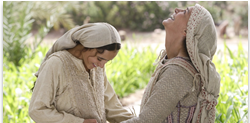
You may have grown up thinking of the Season of Advent as that four-week sprint just before Christmas. Or, maybe you thought of it as the appetizer whose sole purpose was to get you to the main course—Christmas! When you’re a kid waiting for presents (present company included), four weeks of Advent can seem like an eternity. To say that the Season of Advent is four weeks long is liturgically correct albeit a bit short-sighted. The Reign of God broke into the world in the most definitive and subversive way on that first Christmas 2000 years ago, yet the Reign of God is still on the way. Christ has come, but Christ still needs to come.
If that’s true, then we are Advent people all year round. Staying awake for the signs of Jesus’s Second Coming should be our everyday posture 365 days of the year and not just for four weeks. We say as much, do we not, each time we gather for Eucharist? At each Mass, the presider says, “The mystery of faith.” One of the assembly’s responses is this (note the ending): “We proclaim your Death, O Lord, and profess your Resurrection until you come again.” Another response goes like this (note the ending): “When we eat this Bread and drink this Cup, we proclaim your Death, O Lord, until you come again.” These refrains can only fall from the lips of Advent people. They are little reminders that when Jesus returns in glory, there will be no need to eat this Bread nor drink from this Cup, anymore. But, we’re not there yet. We still have to gather. We still have to eat. We still have to drink. So, how do we get there? How do we wait?
We wait for the Second Coming of Jesus by taking our cues from those who waited for His First Coming. The prophets in Biblical times had to keep the embers hot. They had to give hope to people, over centuries, that the Messiah was coming, a new reign would break upon the land and last forever. Because it was hard to keep the edges hot, many gave up hope. However, a small group, a remnant, never gave up hope. They are referred to as the “faithful remnant of Israel.” Here is how they waited and how we are called to wait as well.
1) Wait with a sense of promise. God, through Angel Gabriel, promised Elizabeth and Mary that each would bear a child. God’s promise would be fulfilled. We can only wait for what is already growing within us. If you’re not pregnant, you have no need to wait. But, if you are pregnant, the anticipation, I’m told, is all-consuming. Similarly, a farmer waits for his planting to bear fruit. Trust that what you are waiting for right now is, in some way, already present to you, although not full revealed.
2) Wait actively. You know something is happening. Passive waiting means it’s out of your hands, and you are simply punching in time. However, a patient person remains still knowing the real thing isn’t always tomorrow; it’s right here today. Fear makes us run. The angel says to Mary and to us, “Do not be afraid.”\
3) Wait open-ended. This is the difference between wishing for something versus hoping in something. Wishing says, “This is what I wish for, and it must unfold according to my agenda, or I will be very disappointed.” Hope is feeling confident that God’s plan will be fulfilled according to God’s promises. Let go of wish lists. Hoping says, “Let it happen to me according to your will.” I don’t try to control the situation. I try, instead, to be formed by God’s life-giving will rather than by my own fears.
4) Wait together. Mary and Elizabeth are cousins who sought each other out and helped each other to wait. Each reminded the other of the promise the angel had made and that what they were waiting for would be fulfilled. This is what we owe each other as member of the Church. My job is to remind you that God’s promise is growing in you–so stay close to it—even, and especially, on your worst day. Similarly, your job is to remind me, especially in moments of discouragement, that God’s promise is growing in me and will come to fruition soon. Although we call Pentecost the “birth of the Church,” I think Mary and Elizabeth’s waiting together was the real, but “unofficial” birth of the Church.”
If we wait with a sense of promise, actively, open-ended, and together, Christmas will come of its own accord. And not only that, it will be more fulfilling than anything we could put on our wish list.
Fr. Phil Mulligan
NOV
2021

About the Author: